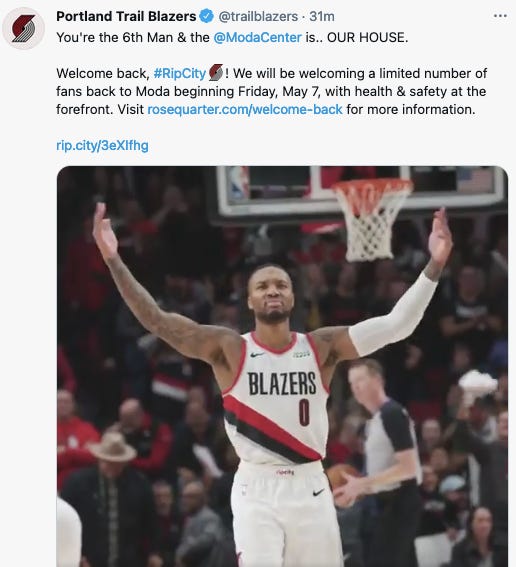I was an athlete through high school and college, and while I had no hope of being a professional athlete, I think I can relate to the above sentiment to at least a small degree. Athletes think of themselves as competitors, but if they’re honest with themselves, they recognize that they’re also entertainers. Especially on the professional level, athletes provide a welcome diversion to those looking to forget about their day-to-day existence, if only for a couple of hours.
Anyone who’s been an athlete at any level understands that playing in front of a crowd provides an added dynamic. There’s an energy boost that comes along with playing in front of people. If it’s your home crowd, you’re hoping to play well and feed off their energy. If you’re the away team, you want nothing more than to shut the fans up and bask in their silent misery.
Since early March 2020, teams here in Oregon have been playing in empty stadiums and arenas. Only now are they beginning to open up in very limited capacities. It’s been a slow and frustrating process, but at least it’s happening.
So far this spring, I’ve seen my soccer team, Portland Timbers FC, play twice at Providence Park in downtown Portland to about 25% capacity. In a stadium that seats just over 25,000, that means a little over 6,000 people. That may not seem like much, but PTFC played all of last season (save for their first two games in early March 2020) before empty seats.
(Tomorrow, Erin and I will get to see PTFC play their main rivals, Seattle Sounders FC. Providence Park will once again only be at about 25% capacity, but those of us in green and gold will be screaming “F—K SEATTLE!!!” long and loud. Yeah, it’s one of the biggest days on the Portland soccer calendar…and it will be great to be there in person again.)
No performer, at any level, feels as if they’ve hit their peak when they’ve played to an empty house. The energy of the crowd is integral to the process, the athletes and crowd feeding off one other to create something that neither could create by themselves. That’s been missing for the past 14 months. Now that it’s returning slowly, I for one am realizing just how much I took it for granted.
This, of course, is all rather trivial when considered in light of a pandemic that has so far claimed nearly 600,000 American lives. Especially when you factor in that COVID-19 has killed millions more around the world and is currently ravaging Brazil and India. Sports have been revealed for the trivial, and yet vital, part of our lives they occupy. They are wholly unnecessary and yet also an important diversion that adds richness and depth to our lives.
I can only speak for myself as a sports fan who’s survived the pandemic, but it’s difficult to imagine sports being taken for granted as they have been for so long. It’s true; you never really miss something until it’s taken away from you.
Until sports return in something closer to their former incarnation, life won’t feel “normal.” Then again, I’m not certain I, nor anyone else, is in a position to define what “normal” will look or feel look going forward. That still feels as if it’s a long ways off.
Stay tuned, eh?





